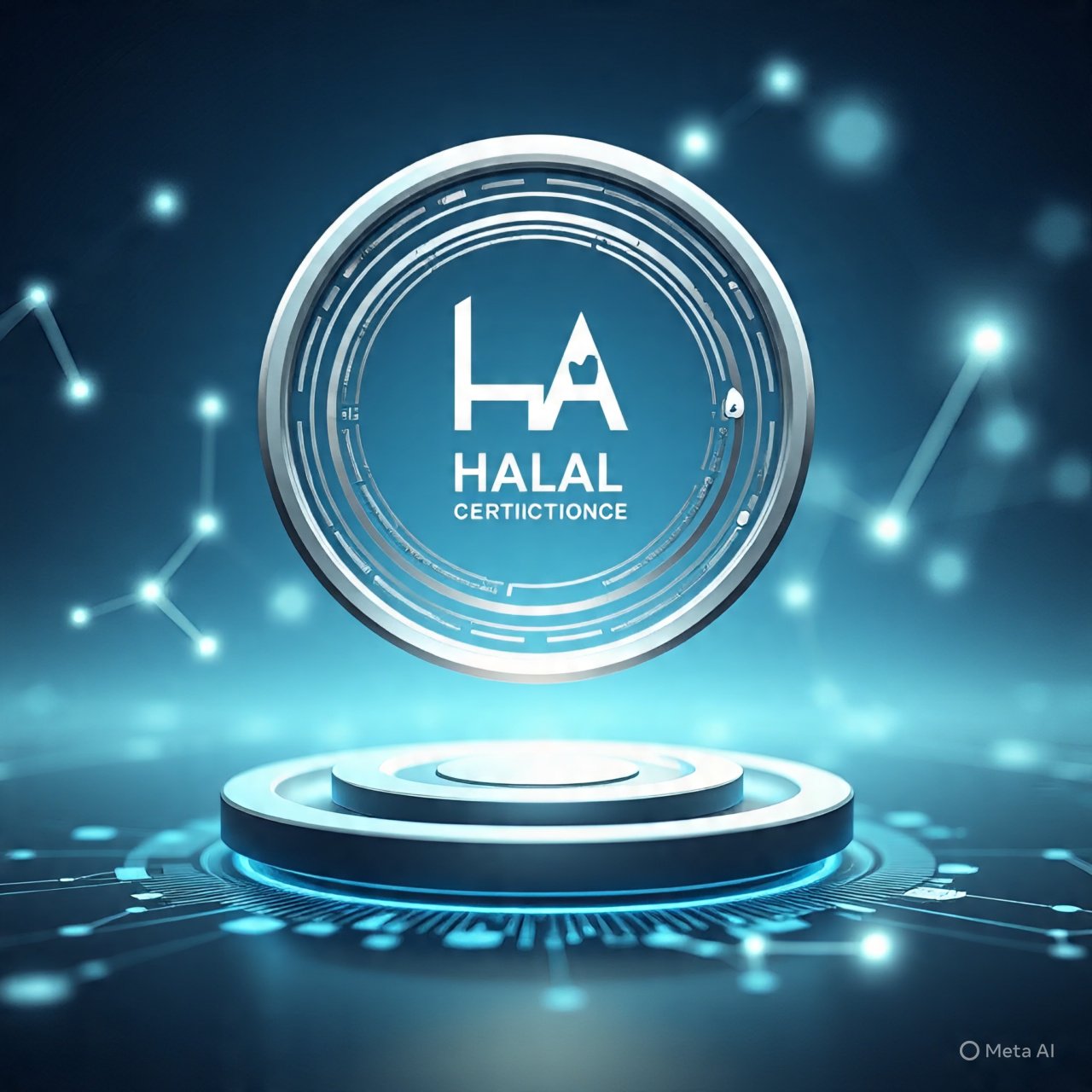Cryptographic Halal Certification – Blockchain Solution
Introduction
The halal industry has become one of the world’s fastest-growing industries, with a global volume exceeding $2.3 trillion. However, along with this growth come serious challenges in halal product verification and supply chain management. Traditional halal certification systems face issues such as document forgery, non-transparent supply chain segments, human errors in verification processes, and differences in halal standards between countries, all of which have affected Muslim consumers’ trust globally. To solve these problems, a revolutionary technology is emerging: “Cryptographic Halal Certification.” This system uses the power of blockchain and quantum cryptography to create a tamper-proof supply chain where complete transparency, verification, and audit of halal compliance are possible at every stage. This article will comprehensively explore this new system’s details, working mechanism, Sharia compliance, and potential global impacts.
Current Challenges in Halal Industry: A Deep Analysis
The global halal industry today faces several fundamental challenges, with supply chain complexity being the most important. In modern global trade, a product’s journey passes through multiple countries and dozens of organizations, making halal monitoring difficult at every stage. Forgery incidents in traditional paper certificates are common, where fake certificates are used to present non-halal products as halal. Differences in halal standards and procedures among various Islamic countries have further complicated international trade. For example, a halal certificate issued in one country may not be acceptable in another. The market is flooded with uncertified products, severely affecting consumer confidence. Inevitable errors in human inspection processes, risks of product mixing from slaughterhouse to retail store, and communication issues in multicultural supply chains have collectively created the need for a modern system that is transparent, secure, immutable, and globally acceptable.
Blockchain Technology: Concept of Decentralized Ledger
Blockchain is essentially a decentralized distributed ledger technology that securely stores transaction records. This technology is based on three key principles: decentralization, transparency, and immutability. Each “block” contains multiple transaction records, and each new block is cryptographically linked to the previous block, forming a chain where altering past records becomes nearly impossible. Decentralization means data is not stored with a single central authority but exists in distributed form among all network participants, eliminating the risk of single point of failure. Transparency means authorized parties can view all system activities in real-time. The immutability feature ensures that once recorded, data cannot be altered in any way, which is extremely important for halal supply chains.
Quantum Cryptography: New Frontiers of Security
Quantum cryptography provides systems that are much more secure than current cryptographic systems. This technology works on quantum key distribution (QKD), where encrypted keys are transferred using quantum states of photons. The fundamental characteristic of quantum cryptography is that if any third party attempts to intercept encrypted messages, the photons’ states change, immediately revealing the interception. This is based on Heisenberg’s Uncertainty Principle, which states that observing a quantum system changes it. This characteristic makes the system extremely secure for halal supply chains, especially in environments where data protection and verification are crucial. Quantum cryptography uses post-quantum cryptography algorithms that are secure against both traditional computers and future quantum computers.
Complete Traceability in Supply Chain: Practical Implementation
In the cryptographic halal certification system, each product is associated with a unique digital identity assigned from the initial production stage. This digital identity is updated at every stage of the product’s journey. Every step from farm to shelf is stored as an immutable record on the blockchain. Complete history of animal feed, care, and treatment during rearing is recorded. At the slaughter stage, all details such as slaughterer’s verification, slaughter time, procedure, and recitation of Islamic prayer are preserved. During processing, packaging, and transportation, temperature, humidity, and other important parameters are continuously monitored through IoT sensors. Consumers can scan QR codes or NFC tags through their mobile devices to view the product’s complete history, including images, videos, and certification details at each stage.
Halal Supply Chain Stages: Comprehensive Data Capture
A complete halal supply chain consists of several key stages, each with specific data capture methods. The first stage is animal rearing and providing halal feed, where feed quality, animal health, and rearing conditions are recorded. The second stage is slaughter according to Islamic principles, where the slaughterer’s qualification, equipment cleanliness, and complete video recording of the procedure are maintained. The third stage is processing and packaging, where cross-contamination prevention measures, temperature control, and packaging material halal compliance are ensured. The fourth stage is storage and transportation, where temperature, humidity, and other factors are continuously monitored during transit. The fifth stage is retail and reaching consumers, where product display and storage conditions are recorded. At each stage, the relevant party records transactions on the blockchain, viewable by all authorized parties but not alterable.
Automated Verification Process: Role of Smart Contracts
In this system, the verification process is automatic and real-time. IoT sensors, RFID tags, and biometric scanners continuously track product movement and condition. Smart contracts automatically verify conditions and perform automatic actions when predefined conditions are met. For example, if a product moves outside the prescribed temperature range, the system immediately issues an alert and notifies relevant parties. All certifications, audits, and inspection results are stored on the blockchain. Artificial Intelligence and Machine Learning algorithms detect anomalous patterns and flag potential violations. The system automatically generates compliance reports and provides real-time updates to regulatory authorities.
Harmonization of Global Halal Standards: One Platform
Cryptographic halal certification system can prove to be an effective means of creating harmony between different countries’ halal standards. This system brings certifying bodies from various Islamic countries onto a common platform where they can share their standards and procedures. International halal standards can be programmed into smart contracts, facilitating automatic verification. This simplifies international trade of products and reduces duplicate certification costs. The system provides a framework for globally agreed halal standards, accommodating specific requirements of different countries. This system can work with organizations like OIC (Organization of Islamic Cooperation) and SMIIC (Standards and Metrology Institute for Islamic Countries) to promote harmonization of halal standards globally.
Benefits for Consumers: Complete Transparency and Trust
This system offers immense benefits for consumers. They can verify the complete halal compliance of products, including detailed information at each stage. They gain complete confidence in product authenticity since no manipulation is possible in the system. Fraud possibilities are practically eliminated, giving consumers confidence in purchasing valuable products. Through mobile applications, consumers can access real-time information including product history, components, and certification details. This system helps consumers make educated choices and better fulfills their religious requirements.
Benefits for Manufacturers: Business Growth Opportunities
For manufacturers, this system brings significant improvement in operational efficiency. Complete visibility at every supply chain stage improves inventory management and reduces losses. Documentation costs can be reduced by 60-70%, while time required for manual processes is also significantly reduced. Fraud risks are practically eliminated, providing financial security. Product credibility increases in the market, enhancing brand value. The system facilitates access to new markets, especially in countries with strict halal regulations. Automated compliance reporting reduces regulatory hurdles and facilitates international trade.
Data Management and Privacy: Balanced Approach
In this system, data management is extremely secure while maintaining privacy requirements. All data is stored in encrypted form using advanced encryption standards (AES-256). Only authorized parties can access relevant information, and their permissions are managed in a hierarchical structure. Data integrity is ensured through cryptographic hashes. Technologies like zero-knowledge proofs can be used for privacy, where information can be verified without revealing actual data. The system can be designed according to data protection laws like GDPR, ensuring protection of consumers’ data rights.
Implementation Stages: Comprehensive Strategy
Successful system implementation requires a phased strategy. In the first stage, APIs and middleware solutions are developed for integration with existing systems. The second stage involves organizing training programs and workshops for staff training. The third stage focuses on infrastructure development, including IoT devices, sensors, and network solutions. The fourth stage establishes strategic partnerships and collaborations involving certifying bodies, technology providers, and industrial organizations. The fifth stage initiates pilot projects, with system improvements based on results. The final stage involves full-scale implementation with continuous monitoring and optimization.
Need for Global Cooperation: Joint Efforts
International cooperation is essential for this system’s success. Mutual cooperation between certifying bodies from different countries is necessary for establishing technical standards. Support from Islamic organizations helps achieve Sharia compliance and acceptance. Working with organizations like OIC, SMIIC, and World Halal Council is necessary for establishing international standards. At government level, regulatory frameworks need to be developed including technical specifications and legal requirements. Coordination with customs authorities and border control agencies is essential for international trade. Joint ventures and knowledge sharing platforms can be established for research and development.
Economic Impacts: New Paths for Development
This system will have wide economic impacts. Halal industry growth rate will increase, creating new employment opportunities. Access to new markets will become easier, especially increasing exports of halal products to non-Muslim countries. Increased consumer confidence will lead to market expansion and higher willingness to pay for premium products. Improved supply chain efficiency will reduce operational costs, increasing profitability. Reduction in fraud and counterfeit products will increase overall industry revenues. The system can be made accessible to SMEs, enabling small businesses to access global markets.
Future Possibilities: Technology Evolution
More advanced applications of this technology are expected in the future. Integration with Artificial Intelligence and Machine Learning will enable predictive analytics and automated quality control. Increased use of Internet of Things (IoT) devices will make real-time monitoring more effective. Augmented Reality applications will allow consumers to view product history interactively. Establishment of global halal ecosystem will further facilitate international trade. Blockchain interoperability will enable data sharing between different networks. With the evolution of quantum computing, new cryptography standards will emerge, further improving system security.
Sharia Aspects: Review from Islamic Perspective
From a Sharia perspective, this system is valid provided all Sharia requirements are met. System design and implementation should be under scholars’ supervision. Compliance with Sharia principles is mandatory, especially no compromise in slaughter commandments. System transparency and accountability are perfectly aligned with Sharia requirements. Digital documentation and electronic verification can be considered Islamically acceptable, as digital transactions have been accepted in modern juristic interpretations. However, traditional mechanisms of human supervision and physical inspection cannot be completely eliminated but should be integrated with technology.
Challenges and Obstacles: Facing Difficulties
System implementation faces several challenges. High initial cost of technical infrastructure could be a barrier for small businesses. Differences in regulations and standards between countries could complicate global system implementation. Adoption rates may vary across regions, creating interoperability issues. Lack of technical expertise and digital literacy could be barriers in some areas. Technical challenges in integration with existing systems may arise. Cybersecurity threats and data breach risks always exist, no matter how secure the system.
Practical Steps: Suggestions and Recommendations
Some important suggestions for successful system implementation include: Start with phased implementation, focusing first on high-value products. Establish proof of concept through pilot projects. Inform stakeholders about benefits through awareness campaigns. Provide incentives and subsidies at government level. Organize workshops and conferences for establishing international standards. Focus on local capacity building through training programs. Provide funding for research and development. Promote public-private partnerships.
Conclusion: New Face of Halal Industry’s Future
Cryptographic halal certification could prove to be an important milestone for the future of halal industry. This system provides a strong framework of transparency, trust, and efficiency that not only meets Muslim consumers’ religious requirements but also elevates global trade standards. This technology adapts the halal industry to modern requirements and makes it an important part of mainstream global economy. As stated in the Holy Quran: “O mankind, eat from whatever is on earth [that is] lawful and good” (Al-Baqarah:168), through this system we can ensure access to pure and halal foods. This is not just technological evolution but a beautiful blend of faith and science that guarantees a better and transparent future for coming generations.


